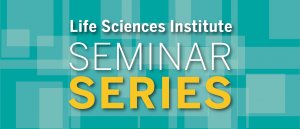Presented By: Life Sciences Institute (LSI)
LSI Seminar Series: Jon Clardy, Ph.D., Harvard Medical School
Chasing molecules and mechanisms in the gut microbiome

Abstract:
Numerous studies with varying degrees of statistical power have found correlations between the composition of the bacterial population in the human gut microbiome and disease states. But the molecules and mechanism(s) connecting a dysbiotic microbiome to a specific disease are generally unknown. In an attempt to address this gap, we undertook a series of screens to link bacterial metabolites with diseases like type 1 diabetes (T1D) and inflammatory bowel disease (IBD). We focused on primary drivers of inflammation like TNFα (tumor necrosis factor alpha) produced by human dendritic cells. This seminar will describe our screening logic, the selection of candidate bacterial strains, the discovery of the small molecule regulators of cytokine production, their structures and biosynthesis, and inflammatory mechanism.
About the speaker:
Jon Clardy obtained his B.S. degree from Yale University and his Ph.D. from Harvard University, both in chemistry. He has served on the Chemistry Department faculties of Iowa State University and Cornell University, and he is currently the Hsien Wu & Daisy Yen Wu Professor of Biological Chemistry & Molecular Pharmacology at Harvard Medical School. His research has focused on naturally occurring biologically active small molecules, their macromolecular targets, and their roles in biology and medicine. His current interests involve the molecular underpinnings of complex symbiotic systems involving both prokaryotes and eukaryotes, bacterial influences on animal and plant development, bacterial communications, and the influence of the human gut microbiome on human health and disease. He currently lectures in graduate courses and teaches a Freshman Seminar entitled Psychoactive Molecules from Babylon to Breaking Bad to Harvard undergraduates.
Numerous studies with varying degrees of statistical power have found correlations between the composition of the bacterial population in the human gut microbiome and disease states. But the molecules and mechanism(s) connecting a dysbiotic microbiome to a specific disease are generally unknown. In an attempt to address this gap, we undertook a series of screens to link bacterial metabolites with diseases like type 1 diabetes (T1D) and inflammatory bowel disease (IBD). We focused on primary drivers of inflammation like TNFα (tumor necrosis factor alpha) produced by human dendritic cells. This seminar will describe our screening logic, the selection of candidate bacterial strains, the discovery of the small molecule regulators of cytokine production, their structures and biosynthesis, and inflammatory mechanism.
About the speaker:
Jon Clardy obtained his B.S. degree from Yale University and his Ph.D. from Harvard University, both in chemistry. He has served on the Chemistry Department faculties of Iowa State University and Cornell University, and he is currently the Hsien Wu & Daisy Yen Wu Professor of Biological Chemistry & Molecular Pharmacology at Harvard Medical School. His research has focused on naturally occurring biologically active small molecules, their macromolecular targets, and their roles in biology and medicine. His current interests involve the molecular underpinnings of complex symbiotic systems involving both prokaryotes and eukaryotes, bacterial influences on animal and plant development, bacterial communications, and the influence of the human gut microbiome on human health and disease. He currently lectures in graduate courses and teaches a Freshman Seminar entitled Psychoactive Molecules from Babylon to Breaking Bad to Harvard undergraduates.